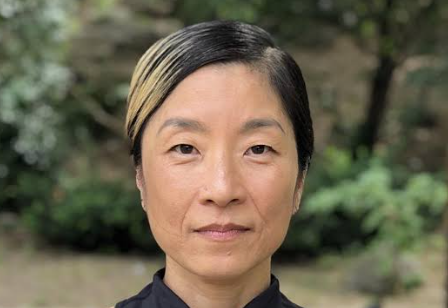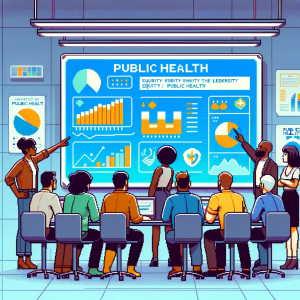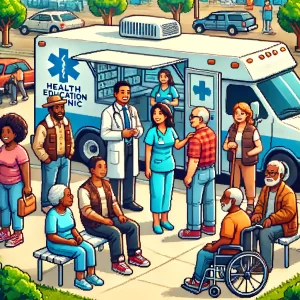
A conversation with J. Robin Moon
Dr. J. Robin Moon, DPH, MPH, MIA, is the co-founder and chief strategy officer of Sana Solutions LLC and a seasoned public health professional with over 25 years of experience across various sectors. As a Korean-American scholar and practitioner, she focuses on health equity, anti-racism, and public health education. Currently an adjunct professor at the City University of New York (CUNY), Dr. Moon’s expertise spans health strategy, Medicaid reform, and organizational development.
She recently co-edited and published a special issue in the Journal of Participatory Research Methods (JPRM) on how communities and research institutions collaborate to tackle structural racism and promote health equity. This issue features 15 articles from various U.S. locations, showcasing participatory research methods addressing structural issues like housing equity and healthcare barriers. The articles highlight the experiences of diverse communities, including immigrant, minoritized, women, children, youth, and underinvested urban and rural populations. We asked Dr. Moon about her vision for this issue and how to further work toward equity and justice.
You can find this special issue at https://jprm.scholasticahq.com/issue/10601-vol-5-issue-2-2024.
What inspired the theme for this special issue on dismantling structural racism and advancing health equity?
Creating the Culture of Health and advancing health equity has been the Robert Wood Johnson Foundation’s vision in creating a number of its signature programs including the Interdisciplinary Research Leaders (IRL) program. Part and parcel of this vision has been confronting structural racism to transform health. It has also been the main theme of our IRL program for the last two years, under which we recruited the current two cohorts (24 teams total).
One of the key goals in this journey is to support and enhance ways that researchers and academic institutions work with communities in equitable and mutually beneficial settings, and that communities progress towards true health equity. The “how” of this work is not always shared. We wanted to highlight and uplift the challenges and successes involved in carrying out research with meaningful community collaboration and shared leadership among leaders in research and community settings.
Equally important, we partnered with the Journal of Participatory Research Methods (JPRM) specifically because it is a journal dedicated to the process, not the outcomes, of such work, and with no pay wall. Scientific rigor and methodological soundness are essential for conducting high-quality community-engaged research; however, the nuances, challenges, and time required to implement the research process are generally underappreciated. The special issue focuses on the complexities of interdisciplinary, community-engaged research and the continuous development and refinement of its methods. Interdisciplinary community-engaged research is still relatively novel and complex, to say the least, and its methods are continuously being developed and refined. It is our goal to contribute to advancing community-engaged research processes and methods, which contribute to advancing health equity.
How do you see the role of community partnerships evolving in the fight against structural racism within public health?
Both the community and the academic/research institutions have been on a steep and unprecedented learning curve to collaborate in fighting against structural racism in the past decade, also marked with the pandemic milestone. I believe we have been recognizing as a country the role of community partnerships in this work. This recognition and beginning is important; however, we have a long way to go.
One important example, of many, of the role of community partnership – it is one thing to design an evidence-based research method, but it requires varied practice-based evidence to implement the research (i.e., when the rubber meets the road) so that it reaps optimal results and evidence to build policy. This cannot be done without true, equitable community partnerships.
The RWJF’s IRL program started in 2015, and since then, we have learned substantially about the ways the community leadership can and has contributed to the work, as well as the ways it has been prevented from contributing. The historical and structural – the inherent institutional power dynamics – barriers trickle down to the individual-level challenges. We have been evolving every year to change the ways we work with not only the community leaders but also the research leaders in supporting and bringing them together to optimize their partnership. By now, we are happy to see that the community is serving our purposes as stated. And we want to share our learning in this joint work and the ways we have evolved with the larger community. This special issue is one great way to do so.

Your work will move at the speed of trust.
How do you ensure the voices of marginalized communities are authentically represented in the research featured in this issue?
The JPRM publishes projects and research that focus on not just including the voices of marginalized communities but rather ensuring that communities are involved deeply in every step of the research process. Communities and private/public stakeholders are active participants in decision-making about the research questions, project design, and dissemination of results toward action. The projects in this issue were peer-reviewed by experienced community-engaged researchers to ensure authentic partnership.
Through the solicitation as well as the review processes, we did our best to include diverse and equitable voices. The articles are from a wide range of U.S. geographies, from California’s Central Valley to rural Missouri to urban Boston and many places in between. They use research methods as varied as photovoice, mapping tools, and the R.A.P.I.D. decision-making framework to address structural issues, such as housing equity or barriers to health care, for an array of communities, including immigrant or minoritized communities, women, children, youth, and disinvested urban and rural communities. Another point worth noting, the “community” and “research” worlds are not so discretely bifurcated; there are community researchers with or without official credentials but without academic affiliations (i.e., living interdisciplinary researchers). We tried to highlight their voices as well.
What impact do you hope this special issue will have on public health policies and practices?
We hope to shed light on good practices and methods that work well in building trust with the communities, and that these practices are truly interdisciplinary and mutually engaging – advancing health equity. We want to bring recognition not only to the greater research community but also to the public, as to what community-engaged research can be, and how it can contribute meaningfully to dismantling structural racism and building a better society.
We also hope to inform and enlighten public health funding communities – foundations, national institutes, and other private/public funding agencies – the critical importance of 1) prioritizing funding community in various ways, 2) improving the way community-engaged research is funded, and 3) thinking more structurally and interdisciplinarily in their funding.
What advice would you give to emerging public health researchers who want to focus on social justice and health equity in their work?
First and foremost, I would encourage them to keep it up! It is not for the faint-hearted, especially if one is dedicated to shared leadership with community partners. It is a long race; so please don’t give up, and do share your learnings as you go – strategically.
Second, speak up, through not only peer-reviewed academic journals but also all other channels and dissemination venues, especially ones that your communities would pay attention to.
Third, find your research community, and do not do this work alone! Find your allies and partners. The value of this community is greater than a sum of its parts. Within your communities, build relationships and build trust. Your work will move at the speed of trust. Mentor even younger ones, your doc students, and postdocs.
Finally, take care of yourself and your community. Find joy in the work you do and the communities you contribute to. Take breaks when you need them; allow others to tap in, when you tap out, and vice versa. This work will take time to bring into fruition, so we have to make our efforts and this movement sustainable.
Be Part of the Change – Get Weekly Updates!
Stay informed and connected. Subscribe for free and share this blog to make a difference in public health with others. If you liked this blog, please share it! Your referrals help This Week in Public Health reach new readers.



